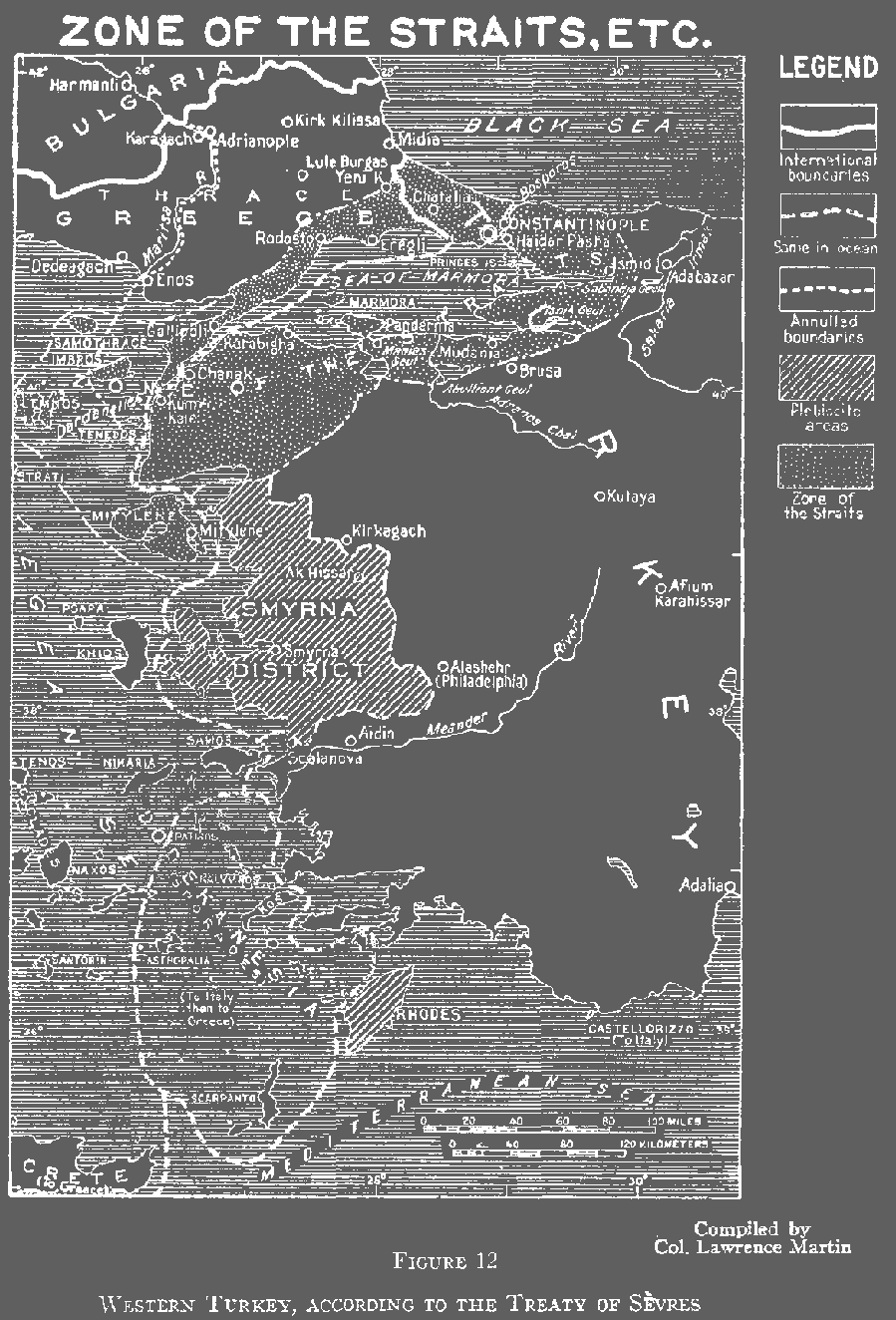No events for Turkey have been written, although some early events have been considered. Heres the timeline for the former Empire of Osman.
1919 May 19, Mustafa Kemal arrived in Samsun, Anatolia, to start the National Struggle.
(http://www.osmanli700.gen.tr/english/sultans.html)
1919 Jun 19, Mustafa Kemal founded the Turkish National Congress at Angora (later Ankara) and denounced the Treaty of Versailles.
(HN, 6/19/98)
1919-1922 The Greco-Turkish war. After the war ethnic Greeks were forced to leave Turkey and ethnic Turks were forced to leave Greece.
(SFEM, 3/12/00, p.28)
1920 Apr 23, The Turkish Grand National Assembly held its first meeting in Ankara.
(HN, 4/23/99)
1920 Jun 25, The Greeks took 8,000 Turkish prisoners in Smyrna.
(HN, 6/25/98)
1920 Aug 10, The Ottoman sultanate at Constantinople signed the Treaty of Sevres, which promised a homeland for the Kurds. The nationalist government in Ankara did not sign the treaty.
(SFC, 2/17/99, p.A10)(PCh, 1992, p.739)(EWH, 4th ed, p.1086)
1920 Aug 10, Turkish government renounced its claim to Israel and recognized the British mandate.
1920-1990 Turkey virtually outlawed the Kurdish language.
1921 Jun 19, Turks and Christians of Palestine signed a friendship treaty against Jews.
1921 Oct 13, In the Treaty of Kars Turkey formally recognized the Armenian Soviet Republic.
(EWH, 4th ed, p.1086)
1921 Oct 13, The Daily Colonist in Victoria BC mentioned the term "cold turkey" in reference to quitting an addiction. This was the first know use of the term in print.
(SFEC, 1/25/98, Z1 p.8)
1921 Kemal Ataturk, a Muslim general, called for sustained military action to "chase the enemy out of our land." He referred to British, French and Italian forces that had helped defeat the Ottoman Empire and were stationed in Istanbul.
1922 Jul 21, Djemal Pasha, dictator of Turkey, was murdered.
(MC, 7/21/02)
1922 Sep 9, Turkish troops conquered Smyrna and murdered Greek citizens.
(MC, 9/9/01)
1922 Nov 1, The Ottoman Empire was abolished.
1923 Mar 6, The Turkish National Assembly rejected the Lausanne Treaty in Angora.
1923 Jul 24, The Treaty of Lausanne, which settled the boundaries of modern Turkey, was concluded in Switzerland. It replaced the Treaty of Sevres and divided the lands inhabited by the Kurds between Turkey, Iraq and Syria.
1923 Aug 13, The Turkish National Congress selected Mustafa Kemal Pasha (Ataturk) as president.
1923 Oct 13, Angora (Ankara) became Turkey's capital.
1923 Oct 29, The Republic of Turkey was proclaimed under Mustafa Kemal Ataturk. Turkey established secular government under Mustafa Kemal Ataturk. He introduced the policy known as Kemalism, which bars any mixing of religious and public life. The country was predominantly Sunni Muslim.
1923 Oct 29, Kemal Ataturk (b.1881) was the founder and first president (1923-38) of the Republic of Turkey. Ataturk grew up to become a soldier, coming to international prominence for his defense of the Gallipoli peninsula during World War I. The Allied powers, eager to claim Ottoman territory, began to occupy territory before the official peace treaty--actions which hardened Ataturk's resolve. Beginning in 1919, Kemal--having resigned his commission--gained military support for a Turkish nationalist movement. He also established a government in Ankara, some 300 miles from the Sultan in Istanbul. Nationalist forces eventually found victory with the Treaty of Lausanne, signed in 1923. As president, Ataturk instituted a number of legal and educational reforms, expanded women’s rights and encouraged adoption of some European customs (such as the use of the Latin alphabet). He died in 1938 of cirrhosis of the liver.
1924 Mar 3, Kemal Ataturk forced the abolition of the Muslim caliphate through the protesting assembly and banned all Kurdish schools, publications and associations. This ended the Ottoman Empire and created the modern Middle East, though Iraq, Jordan, Syria and Saudi Arabia were still colonies of Britain and France.
(WSJ, 2/11/99, p.A24)(SSFC, 10/14/01, p.A3)
1924 Mar 3, German and Turkish friendship and trade treaty was signed.
(SC, 3/3/02)
1925 Jan 30, Turkish government threw out Constantine VI, the Orthodox Patriarch of Constantinople.
(MC, 1/30/02)
1925 Feb 26, Jihad-Saint war against Turkish government.
(SC, 2/26/02)
1925 Apr 28, Kurd rebels surrendered to Turkish army.
(MC, 4/28/02)
1925 Nov, In Turkey Ataturk outlawed the tasseled fez headwear for men. He also outlawed the wearing of veils by women but the tradition continued.
(WSJ, 3/27/96, p.A-16)(WSJ, 11/6/97, p.B1)(EWH, 4th ed, p.1087)
1926 A state code designated the husband as head of the family. The wife had no legal say in decisions concerning the home or children. Equal status was attained in 2001 and made effective Jan 1, 2002.
(SFC, 11/23/01, p.A21)
1928 Nov 3, Turkey switched from Arabic to Roman alphabet.
(MC, 11/3/01)
1929 Jan 31, Leon Trotsky was expelled from Russia to Turkey.
(WSJ, 2/29/96, p. A-14)(MC, 1/31/02)
1929 Dec 6, Turkey introduced female suffrage.
(MC, 12/6/01)
1930 Mar 28, The names of the Turkish cities of Constantinople and Angora were changed to Istanbul and Ankara.
(AP, 3/28/97)(HN, 3/28/98)
1930-1937 Kurdish revolts in Turkey were harshly suppressed.
(SSFC, 12/22/02, p.A14)
1933 Franz Werfel (1890-1945), Czech-born Austrian writer, authored "The Forty Days of Musa Dagh," an account of the 1915 Armenian resistance to Turkey. The author's friend, Rabbi Albert Amateau, testified in 1989 that Werfel was ashamed for having written the book, learning that he had extensively relied on the forgeries of Aram Andonian, which provides the only "evidence" of extermination orders.





